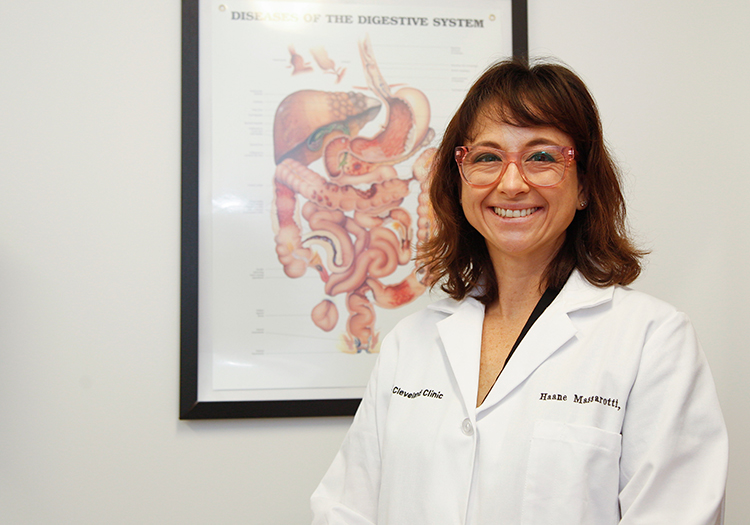
Dr. Haane Massarotti recently joined Cleveland Clinic Indian River Hospital to lead the colon and rectal surgery program, which now can provide colorectal care through minimally invasive robotic surgery. Prior to her arrival, patients seeking the most advanced robotic surgery for colorectal cancer would have to drive to Orlando or South Florida.
“Colorectal surgery is done with open or minimally invasive procedures,” said Dr. Massarotti.
“Prior to me coming on board, most colorectal surgeries were done laparoscopically or open with some robotic use. Our new robotic system is designed solely for use in colorectal surgery, which involves all surgery within the colon, rectum and anus.
“This advanced technology enables us to remove both malignant and benign colorectal cancers and polyps, and to treat diverticulitis, pelvic prolapse and Crohn’s disease. The rectum is a very narrow space in the deep bony pelvis which houses the blood vessels and nerves, so the greatest benefit of the robotic is operating on the rectum because of the confined space.”
Contrary to some popular beliefs, robotic surgery is not performed by an autonomous robot.
Instead, the technology provides a highly precise tool used by surgeons to perform the surgery.
There are three parts to the robotic device: the surgeon console, the patient side cart and the vision stack. The surgeon sits at the console and there is a side cart attached to instruments or robotic arms that go into the patient’s abdomen through small incisions.
The surgeon console enables the surgeon to see 3-D, high-definition images within the body.
The system provides increased visualization in small spaces, along with increased dexterity and accuracy. The surgeon controls the tiny instruments through the console. The wristed instruments move like a human hand but with a far greater range of motion and precision.
The patient side cart is positioned near the patient on the operating table. It is where the instruments used during the operation move in real time in response to the surgeon’s hand movements at the surgeon console.
The vision cart makes communication between the components of the system possible and provides a screen for the care team to view the operation.
“There are many benefits of robotic colorectal surgery over laparoscopic or open surgery,” Dr. Massarotti said. “It requires a shorter hospitalization stay, decreased pain and discomfort, faster recover time, smaller incisions, decreased need for blood infusion, and less scaring. The patient is generally released from the hospital within two to three days and back to doing normal activities in a couple of weeks.
“But this procedure isn’t for everyone. Robotic surgery is one of the many tools that we have to work with, but not the only one.
“Our goal is safety, quality and cancer cure. If we can cure cancer with quality care utilizing the robot then we will, but sometimes that is not the case, and we will proceed with laparoscopic or open surgery. This is a decision made between the surgeon and the patient based on the patient’s primary pathology, medical diagnosis and surgical history.”
According to Dr. Massarotti, colon cancer is the third most common cancer in the United States, and it affects both men and women equally. While it’s historically been associated with the older population, more and more younger people are being diagnosed with the disease, which is one reason the suggested age for a colon screening has been dropped from 50 to 45 for insurance purposes. The good news is that if diagnosed early enough, colorectal cancer is completely curable.
“I became a colorectal surgeon because not only can I help people that are suffering from cancer, but I can also help those who are experiencing embarrassing or debilitating issues with their bowels and vastly improve their quality of life,” Dr. Massarotti said.
“I encourage anyone who has any colorectal complaints such as a change in bowel habits, bleeding, constipation or unexplained weight loss to consult with their primary care physician.
If these issues are not getting resolved with simple intervention, then they should consider seeing a gastroenterologist who will further evaluate and diagnose the source of the problem.
Before the patient gets to me, they have seen multiple specialists who will all work together to come up with a treatment.”
The risk of getting colorectal cancer can be reduced by minimizing the consumption of red meat while increasing the intake of fruits, vegetables and fibrous food in your diet. Drink plenty of water, maintain a healthy weight, exercise 30 minutes a day, and don’t smoke or drink alcohol. Also get your regular colonoscopy screening even if you don’t have any symptoms beginning at the age of 45.
Dr. Massarotti is the only colorectal surgeon on the staff of Cleveland Clinic Indian River Hospital. She received her medical degree from the University of Hawaii John A. Burns School of Medicine and completed her general surgery residency at the Lehigh Valley Health Network in Allentown, Pa. Her ACGME fellowship in colon and rectal surgery was completed at Cleveland Clinic Florida.
As a colorectal surgeon, she is double board-certified; recognized by the American Board of Surgery for general surgery with additional certification through the American Board of Colon and Rectal Surgery. Her office is located in the Health and Wellness Center at Cleveland Clinic Indian River Hospital, 3450 11th Court, Vero Beach. For an appointment call 772-770-0323.



